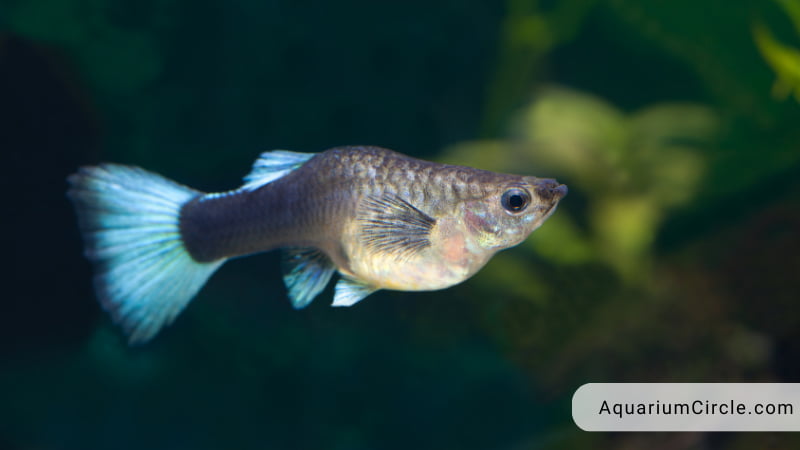Pregnant guppies are a popular species of aquarium fish that are known for their ability to breed quickly and easily. These small and colorful fish are beloved by many hobbyists, especially those who enjoy watching the fascinating process of pregnancy and birth in fish.
In this article, we will explore the world of the pregnant guppy, including their signs of pregnancy and how to care for them during and after birth. Whether you’re a seasoned guppy enthusiast or new to the world of fish breeding, there’s something here for everyone to learn about these amazing creatures.
See also:
- Guppy Fish Giving Birth: Top Useful Suggestions To Learn
- How Do Guppies Mate – Breeding Time, Care For Fry Guppy Fish
- Guppy Fry – Basic Care For Baby Guppies
How To Tell If A Guppy Fish Is Pregnant?
To tell if a guppy fish is pregnant, there are several ways you can observe its behavior and appearance. The most obvious sign is the gravid spot, which is a dark spot near the fish’s anal fin. This spot becomes more prominent as the pregnancy progresses because it contains the developing embryos. Female guppy fish may also hide more often, become less active, and spend more time near the bottom of the tank. They may also have a rounder, more bulbous shape than non-pregnant females, especially when viewed from above.
Additionally, if you’ve seen male guppies courting and chasing a female and then suddenly lose interest in her, it’s possible that she is now pregnant and no longer receptive to mating. By observing your guppies regularly and getting to know their behavior and appearance over time, you’ll be able to recognize pregnancy more easily.
See also: Guppy Fish Male And Female Are Easy To Identify: Ways To Know Them
When A Guppy Is Pregnant, What Does It Look Like?
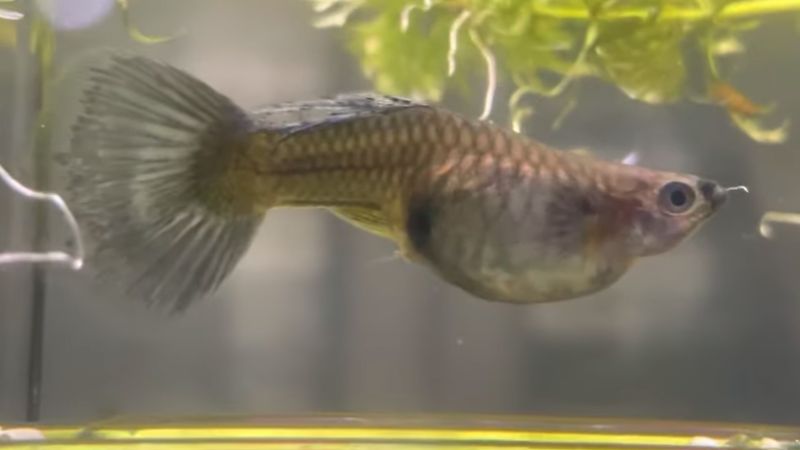
When a female guppy is pregnant, it may look slightly different than non-pregnant female. The most noticeable physical sign of pregnancy is the guppy gravid spot, a dark spot located near the guppy’s anal fin. As the embryos develop, the spot becomes darker and more prominent, making it easier to spot. The pregnant guppy’s belly may also appear more rounded or enlarged compared to non-pregnant female fish. When viewed from above, the body shape may appear more bulbous than usual.
Furthermore, pregnant females may exhibit behavioral changes such as hiding more often, becoming less active, and spending more time near the bottom of the tank. Some guppies may also lose interest in food as they near the end of their pregnancy. Overall, by observing the gravid spot and changes in behavior and appearance, you can determine if a guppy is pregnant and prepare for the upcoming birth.
How Long Is Guppy Gestation Period?
The gestation period for guppies is relatively short, usually ranging from 21 to 30 days. However, the exact length of the gestation period can vary depending on factors such as water temperature, genetics, and the health of the mother guppy.
In some cases, guppies may give birth a few days earlier or later than expected. It’s important to keep an eye on your pregnant guppies and monitor their behavior and appearance regularly to ensure that they are healthy and ready to give birth. Once the gestation period is over and the guppies have given birth, it’s important to provide appropriate care for both the mother and her fry to ensure their health and survival.
How Long Does It Take A Guppy To Give Birth?
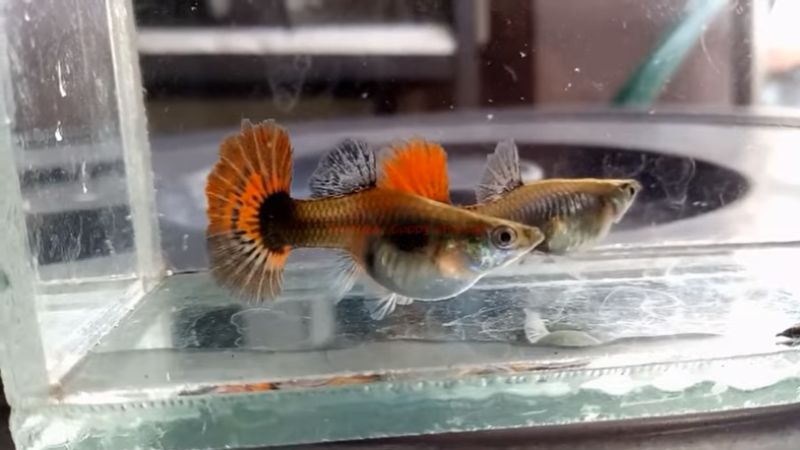
The birthing process for guppies usually takes around 2 to 4 hours, but it can take up to 12 hours for the entire process to be completed. During this time, the pregnant guppy will give birth to live to fry one at a time. The number of fry can vary from as few as five to as many as 100, depending on factors such as the size and age of the mother guppy.
It’s important to keep an eye on the mother guppy during the birthing process and provide a safe and comfortable environment for her to give birth. Once the birthing process is over, it’s important to remove the mother guppy from the breeding tank and transfer the fry to a separate tank to prevent them from being eaten by other fish. Providing appropriate care for the newborn fry is crucial for their survival and growth.
What Are The Signs Of Delivery In Pregnant Guppy?
Identifying the signs that a female guppy fish is preparing to give birth is crucial to providing a safe and secure environment for both the mother and her offspring. Although the specific indicators may differ among guppies, there are typically three common signs to observe:
- Restlessness: Pregnant guppies may become more active and restless in the hours leading up to delivery. They may swim rapidly and erratically or rub themselves against objects in the tank.
- Hiding: Some pregnant guppies may hide in plants or other hiding spots in the tank as they prepare to give birth.
- Swollen Abdomen: The guppy’s belly may appear even more swollen and rounded than usual, indicating that delivery is imminent.
- Contractions: You may notice the pregnant guppy’s body twitching or contracting as she prepares to deliver each fry.
- Increased Breathing: Pregnant guppies may breathe more rapidly as they prepare for delivery.
- Visible Fry: As delivery progresses, you may be able to see the eyes or tails of the fry protruding from the mother guppy’s vent.
Preparing For A Pregnant Female Guppies
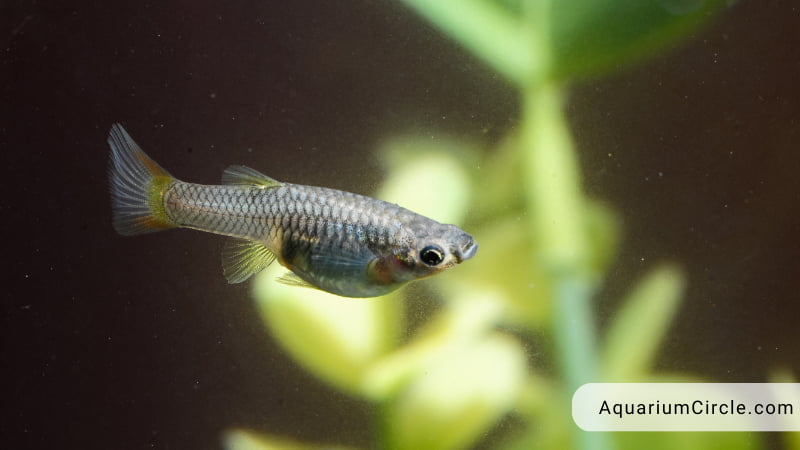
Preparing for a pregnant guppy involves setting up the tank, providing appropriate nutrition, and ensuring the water conditions are suitable for the mother and her developing fry. Here are some steps to follow:
Tank set-up
Pregnant guppies need a safe and comfortable environment to give birth and care for their offspring. Ensure the tank is appropriately sized for the number of fish and has plenty of plants or other hiding spots for the pregnant guppy to use. A separate breeding tank can also be used to keep the mother and her fry isolated from other fish.
See also: How Many Guppies In A 10 Gallon Tank? – 5 Things To Focus
Diet
A pregnant guppy requires a nutrient-rich diet to support her and her developing fry. Offer a varied diet of high-quality flake food, live or frozen foods, and vegetable matter to ensure she receives all the necessary nutrients.
Water conditions
Water quality is crucial for the health of the pregnant guppy and her fry. Monitor the water temperature, pH, and ammonia levels to ensure they are within the appropriate range. Perform regular water changes to maintain optimal water quality.
Accessories
Include accessories such as a breeding trap, air stones, and a heater to ensure that the pregnant guppy and her fry are comfortable and safe.
By following these steps, you can ensure that the pregnant guppy and her fry are healthy and well-cared for. Remember to monitor the pregnant guppy regularly, and seek advice from a veterinarian or experienced aquarium hobbyist if you have any concerns.
Caring For Pregnant Guppy – Informative Care Guide
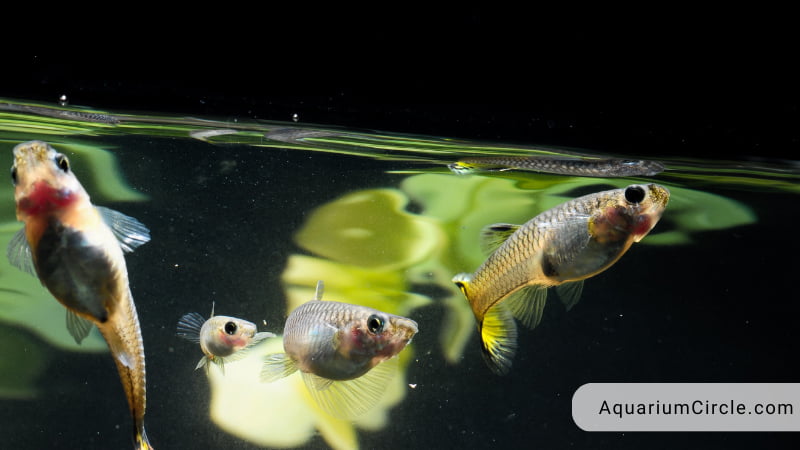
Caring for a pregnant guppy requires attentive observation and monitoring, as well as providing appropriate handling and stress reduction to ensure the health and well-being of both the mother and her developing fry. Here are some tips you can follow:
Handling and stress reduction
Pregnant guppies can become stressed and agitated by excessive handling, loud noises, and other disturbances. This stress can cause premature birth or even death for the mother and her fry. It’s important to handle the fish as little as possible and avoid sudden movements or loud noises around the tank. Provide a quiet and calm environment for the pregnant guppy to reduce stress.
Separating pregnant guppies from others
Pregnant guppies can become harassed by other fish, which can cause stress and complications during pregnancy. It’s best to keep pregnant guppies in a separate breeding tank or a breeding trap within the main tank to prevent other fish from disturbing them. This will also help to ensure that the newborn fry have a safe and comfortable environment to grow in.
Monitoring for signs of labor
Keep an eye on the pregnant guppy for signs of labor, such as restlessness, contractions, or visible fry protruding from the vent. If labor appears to be difficult or prolonged, seek advice from a veterinarian or experienced aquarium hobbyist. It’s important to ensure that the pregnant guppy is comfortable and has the necessary support during delivery.
Providing proper nutrition
Pregnant guppies require a nutrient-rich diet to support themselves and their developing fry. Offer a varied diet of high-quality flake food, live or frozen foods, and vegetable matter to ensure they receive all necessary nutrients. Providing proper nutrition will help to ensure the health of the mother and her fry.
When Should We Separate Pregnant Guppy For The Birthing Tank?
It is recommended to separate pregnant guppies and move them to a birthing or breeding tank before they give birth. This is because pregnant guppies can become stressed in a community tank and may be vulnerable to harassment from other fish.
It’s a good idea to move the pregnant guppy to the birthing tank a few days before she is due to give birth. This will allow her to get used to the new environment and reduce her stress levels. Make sure the birthing tank is equipped with appropriate filtration and a heater to maintain a stable temperature.
Once the guppy has given birth, you can remove her from the birthing tank and return her to the community tank. The fry should be left in the birthing tank until they are large enough to fend for themselves, which usually takes about 2-3 weeks.
How Many Baby Guppies Can The Parents Have?
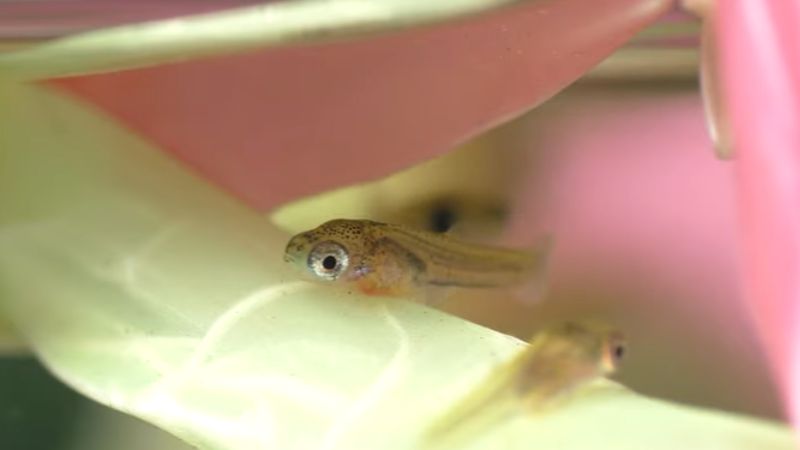
Guppies are livebearing fish, which means that they give birth to live young rather than laying eggs. The number of baby guppy fish (also called fry) that a female guppy can have depends on several factors, including her age, size, and health, as well as the size and genetic background of the male guppy.
On average, a healthy female guppy can give birth to between 20 and 40 fry per pregnancy, although some females may have larger or smaller litters. Guppies are known for their high reproductive rate, and females can become pregnant again soon after giving birth.
It’s important to note that if you’re keeping guppies in a community tank, you’ll need to provide plenty of hiding places for the fry to avoid being eaten by other fish. You may also want to consider separating the pregnant fish into a breeding tank to increase the survival rate of the fry.
How To Take Care Of Guppy Fry?
Taking care of guppy fry can be a rewarding and exciting experience. Here are some tips on how to take care of them:
- Separation: It is best to separate the fry from adult guppies as soon as possible. This will help to prevent the adult guppies from eating the fry.
- Food: Guppy fry require special food. You can find commercial fry food at your local pet store, or you can make your own by grinding up adult guppy food into a fine powder. Feed the fry small amounts of food several times a day.
- Water quality: It is important to keep the water clean and well-maintained. Make sure the tank is cycled and that the water parameters are stable. Regular water changes are necessary to keep the water clean and healthy.
- Tank size: A smaller tank or container is ideal for guppy fry as it helps to keep them safe and makes it easier to monitor their behavior.
- Temperature: The ideal temperature for guppy fry is between 78-80°F (25-26.7°C). Make sure to monitor the temperature of the tank and adjust it accordingly.
- Filter: A sponge filter or a gentle filter is ideal for a guppy fry tank. It is important to make sure that the filter does not suck up the fry, as they are very small and delicate.
- Plants: Live plants can provide cover for the fry and also help to improve the water quality. Provide plenty of hiding places for the fry to reduce stress and increase their chances of survival.
By following these tips, you can help to ensure that your guppy fry grow up healthy and strong.
Video About Pregnant Guppy
FAQs
How long is the gestation period for guppies?
The gestation period for guppies is typically around 21-30 days.
Can I keep a pregnant guppy with other fish?
It’s best to separate pregnant guppies from other fish as they can be stressed and harassed by other fish.
How can I tell if a guppy is pregnant?
You can tell if a guppy is pregnant by looking for a dark spot (gravid spot) near the anal fin, and by observing her behavior, such as a distended belly and hiding more often.
What should I feed my pregnant guppy?
Pregnant guppies should be fed a varied diet of high-quality flake food, frozen or live foods, and vegetable matter to ensure they receive enough nutrients for themselves and their developing fry.
How many fries can a pregnant guppy have?
A pregnant guppy can have anywhere from 5 to 100 fry, depending on factors such as age, health, and genetics.
References:

Annette M. Chaney is an experienced marine biologist with over 20 years of experience as an aquarist and fishkeeper. She started her first aquarium at a young age, filling it with frogs and goldfish obtained from the ten-cent pet store.
Annette grew up caring for and breeding African Cichlids, which led to a hobby in high school that doubled as a profitable means. Attending Reed College gave her time to solidify herself as an accomplished aquarium caretaker with an eye for sales. After that, from 2009 – 2013, she studied at Roger Williams University – one of the most prestigious universities for Aquaculture and Aquarium in USA. She is the founder of AquariumCircle since 2010.
